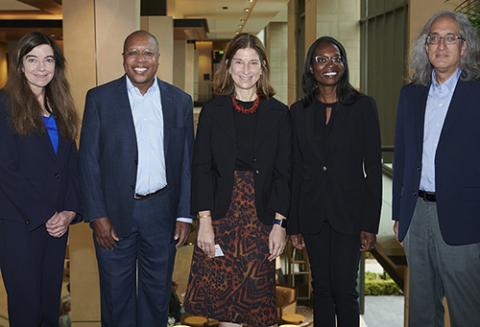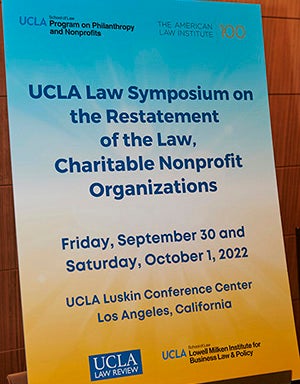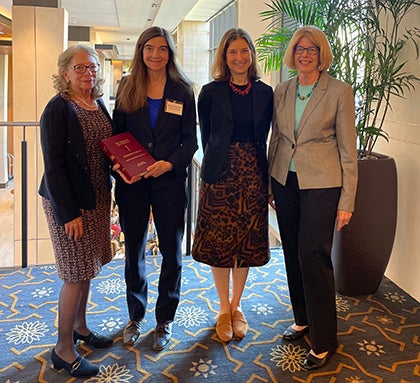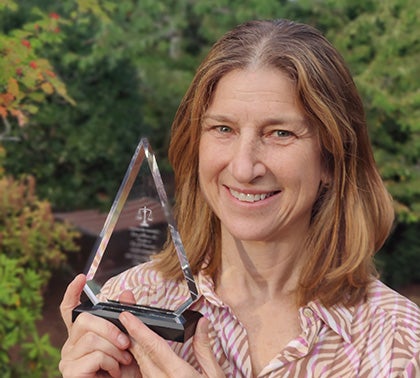‘Heroic’ journey: How Jill Horwitz brought the ‘Restatement of Charitable Nonprofits’ to life

When more than 40 experts in the law of charitable nonprofit organizations gathered at UCLA School of Law toward the end of 2022, the early fall weather had not yet turned cool, and the warmth outdoors reflected the positive spirit of the occasion.
There, at the “Symposium on the Restatement of the Law, Charitable Nonprofit Organizations,” the most eminent scholars, regulators and practitioners in the field participated in a summit full of panels and presentations that marked the release of the American Law Institute’s Restatement of the Law, Charitable Nonprofit Organizations.
The ALI publishes restatements, the renowned series of definitive publications that explore and clarify the law in a wide array of legal fields, and the Restatement of Charitable Nonprofits is the first one on its subject. It offers a comprehensive compendium of the legal issues that confront the more than one million entities – including hospital systems, universities, local theater groups and community food banks – whose importance is rapidly expanding.
It is also the product of more than a decade of dedication and work of a team of experts who were led by UCLA Law Professor Jill Horwitz.
Horwitz holds the David Sanders Professorship in Law and Medicine at UCLA Law, and she is the founding faculty director of the Program on Philanthropy and Nonprofits, which is housed in the law school’s Lowell Milken Institute for Business Law and Policy. She served as the reporter on the restatement with associate reporter Nancy McLaughlin of the University of Utah’s S. J. Quinney College of Law and the late Marion Fremont-Smith of Harvard University’s John F. Kennedy School of Government, who was a co-reporter during the beginning of the project and served as a consultant throughout.
 The symposium, like many other things in and around the project, was Horwitz’s brainchild.
The symposium, like many other things in and around the project, was Horwitz’s brainchild.
“Our work on the restatement was extremely gratifying, particularly the opportunity to learn from so many experts with different perspectives on the law of charities. And the symposium was a terrific start to scholarly engagement with the practical issues we addressed in the restatement,” Horwitz says. “The top authorities in the charitable nonprofits universe came to UCLA Law to celebrate the years of collective hard work that we put into this landmark publication, the first of its kind. It was also a moment to consider where the sector is heading and how the law can help these important organizations grow to meet the times.”
An incredible undertaking
The ALI creates restatements of the law and model codes for lawyers, judges, scholars, businesspeople and others who work in, study and interact with key areas of legal practice. Restatements are treatises that inform readers about the black-letter law that underpins foundational topics, including contracts, torts, property and employment law.
In putting together a restatement, reporters examine court decisions, statutes, regulations and other primary authorities to draft an authoritative statement of the law – typically but not only state common law – at its best. In creating a robust product, reporters must synthesize the knowledge and viewpoints of many stakeholders.
Roberta Ramo was among the dignitaries who descended on UCLA Law for the symposium. A shareholder with the law firm of Modrall Sperling in New Mexico, Ramo is the immediate past president of the ALI and a former president of the American Bar Association. She was the first woman ever to lead either of those eminent legal organizations. Throughout her career, Ramo has overseen the creation or revision of many restatements, and she puts Horwitz’s monumental accomplishment into perspective.
“Being the reporter for an updated restatement of the law is an enormously difficult task. Being the reporter for a completely new restatement, especially one as broad as nonprofit organizations, is heroic,” Ramo says. “Jill became the reporter for the first Restatement of Charitable Nonprofits, with Marion Freemont-Smith, who had worked on earlier attempts. She earned the trust and admiration of the distinguished advisers, the council of the ALI and the members.”

Ramo continues, “Tocqueville wrote with astonishment and admiration of the importance of volunteer groups in the United States. That importance has grown over the years. This one restatement had to encompass the law that affects a small soup kitchen and the Metropolitan Opera and everything in between.”
Horwitz and her colleagues designed the Restatement of Charitable Nonprofits to mirror what she describes as the life cycle of a nonprofit organization. The treatise therefore traces the birth, life and death of a charity. The final project includes sections on the definition of charity and choice of form; governance; changes to purpose and organization; dissolution, restrictions on charitable assets and enforcement of pledges; and standing of private parties.
“Drafting the Restatement of Charitable Nonprofits required a legal architect to build the scaffolding; a scholar to bind to it the law of the various states, the federal government and the tax laws; and a brilliant mind to embroider it with the reporter’s notes, comments and hypotheticals that make the restatements the huge aid that they are to lawyers and judges,” Ramo says. “But it also required humility and the ability to use the great talents of associate reporters and respond to the years of comments and ideas from the broader ALI. Jill was the leader who fulfilled all of those roles.”
‘A critical tool’
It has been a year since the symposium ended – and over 10 years since the work of Horwitz and her team began – but the conversation has certainly continued. What’s more, lawyers across the country have already come to depend on the restatement in their day-to-day work.
This fall, in further commemoration of the Restatement of Charitable Nonprofits’ publication, the UCLA Law Review is issuing a series of articles by Horwitz and her colleagues in its Discourse section. The works of scholarship stem from the authors’ involvement in the symposium:
- “Preface to the UCLA Symposium on the Restatement of the Law, Charitable Nonprofit Organizations” by Horwitz;
- “When Donor Meets Purpose” by Atinuke Adediran of Fordham University School of Law;
- “The Restatement of Charitable Nonprofits and the Changing Nature of the Modern Investment Committee” by Garry Jenkins of the University of Minnesota Law School;
- “Use of Restricted Assets During a Crisis: Is It Time to Raid the Endowment?” by Horwitz;
- “Laws Governing Restrictions on Charitable Gifts: The Consequences of Codification” by Nancy McLaughlin of the University of Utah’s S. J. Quinney College of Law;
- “Allocating State Authority Over Charitable Nonprofit Organizations” by Lloyd Hitoshi Mayer of the University of Notre Dame Law School.

In Horwitz’s detailed preface, she emphasizes that a “restatement of charitable nonprofit law was badly needed” because, while the common law of nonprofits can be traced to the 17th century, if not earlier, “few lawyers, including the judges and practitioners who must work with this body of law, have expertise in the subject.”
“The symposium represents an exciting collection of perspectives and new ideas, developed by both established and new scholars in the field,” Horwitz says. “The purpose of these essays – and this whole project – is to make this complex and ever-changing area of the law accessible and applicable for every interested practitioner, as well as to understand and challenge conventional thinking to meet contemporary needs. I hope that people will use these UCLA Law Review articles in tandem with the restatement.”
The editors of the UCLA Law Review are not the first UCLA Law students to play a part. Back when she and her colleagues were crafting the restatement, Horwitz was able to use her work as a cutting-edge teaching tool. She created a seminar in nonprofit law drafting that allowed UCLA Law students to contribute to the Restatement of Charitable Nonprofits and learn about the substantive law of charities. In the course, students gained experience in writing and revising precise legal rules, an appreciation of the common law, and skills in project management and group collaboration. The finished product contains sections that they wrote.
Now, the broader public truly stands to benefit.
“The restatement is a critical tool from a practitioner’s perspective,” says David Shevlin, a partner at Simpson Thacher & Bartlett in New York, who heads the firm’s exempt organizations practice. A leading lawyer in the field, Shevlin participated in the symposium at UCLA Law and relies on the Restatement of Charitable Nonprofits as an invaluable resource in his practice.
“The restatement covers the life cycle of fundamental legal issues for nonprofits, from issues regarding formation to ongoing governance, and then fundamental changes,” Shevlin says. “To have a tool that so comprehensively addresses these issues is extremely useful as we navigate an ever-evolving legal landscape for nonprofits.”
Recognition for the vast impact of Horwitz and her colleagues’ accomplishment has come in from elsewhere across the upper reaches of the legal academy and legal practice.
Martha Minow is the 300th Anniversary Professor at Harvard Law School, where she served as dean for eight years. Her many wide-ranging areas of expertise include nonprofit organizations.
“Charitable nonprofit organizations touch all of our lives – across health care education, social services, arts, religious and civic activities, and the relevant laws span trusts, property, corporate law, as well as state and federal constitutional and tax laws,” Minow says. “Making sense of it all is vital for the organizations themselves and for government and private lawyers – and Jill Horwitz and colleagues have distilled these varied sources into a pioneering, accessible and clarifying restatement that is already strengthening the work across this sector – reaching 10% of the American workforce – and involving more than $2.6 trillion annual revenues.”
Terri Cammarano is the senior vice president of legal affairs and general counsel of Cedars-Sinai, which ranks among the largest healthcare nonprofit organizations in Los Angeles and the country. She also participated in the symposium at UCLA Law and fully agrees about the restatement’s innovation and impact.
“The legal principles that govern charitable organizations and gifts are vast, siloed and not always intuitive,” Cammarano says. “The restatement is the first time nonprofit charitable law beyond tax-exemption has been gathered, synthesized and organized into a single source. It should be the first stop on any research journey involving philanthropy and nonprofit governance and management – it would be inefficient, frustrating (and, dare I say, malpractice?) to advise a charity without the restatement at hand.”
It was an undertaking, all concur, for which Horwitz – who won the ABA’s Outstanding Nonprofit Lawyer Award earlier this year, for her immense contributions to the field – is uniquely suited.
“Every lawyer who represents nonprofits and who sits on the board of a nonprofit has this volume on their desks,” Ramo marvels. “State attorney generals, who in the main oversee nonprofits in the states, look to it for the law. Judges look to it as the many issues facing charitable nonprofits make their way through litigation. Professor Horwitz is the nationally recognized thought leader in this area of the law.”